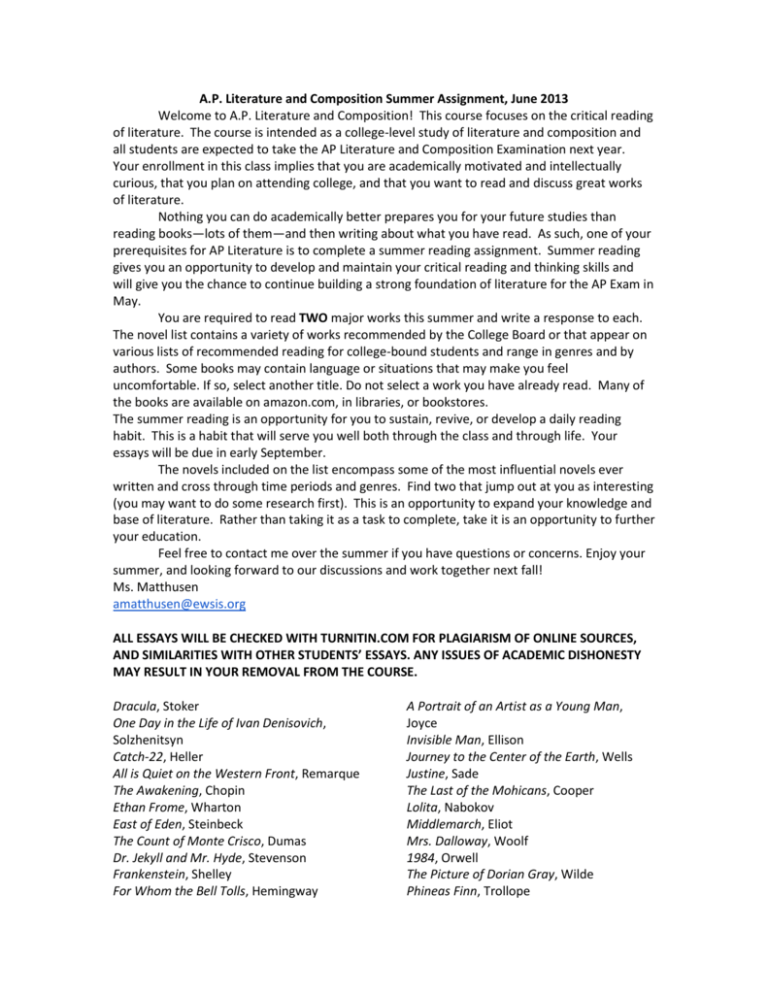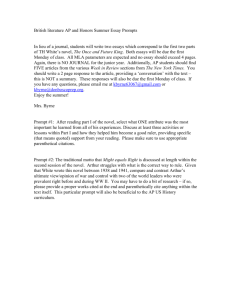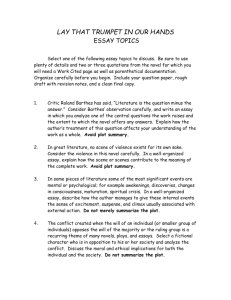AP Lit & Comp Summer Assignment 2013.doc - East
advertisement

A.P. Literature and Composition Summer Assignment, June 2013 Welcome to A.P. Literature and Composition! This course focuses on the critical reading of literature. The course is intended as a college-level study of literature and composition and all students are expected to take the AP Literature and Composition Examination next year. Your enrollment in this class implies that you are academically motivated and intellectually curious, that you plan on attending college, and that you want to read and discuss great works of literature. Nothing you can do academically better prepares you for your future studies than reading books—lots of them—and then writing about what you have read. As such, one of your prerequisites for AP Literature is to complete a summer reading assignment. Summer reading gives you an opportunity to develop and maintain your critical reading and thinking skills and will give you the chance to continue building a strong foundation of literature for the AP Exam in May. You are required to read TWO major works this summer and write a response to each. The novel list contains a variety of works recommended by the College Board or that appear on various lists of recommended reading for college-bound students and range in genres and by authors. Some books may contain language or situations that may make you feel uncomfortable. If so, select another title. Do not select a work you have already read. Many of the books are available on amazon.com, in libraries, or bookstores. The summer reading is an opportunity for you to sustain, revive, or develop a daily reading habit. This is a habit that will serve you well both through the class and through life. Your essays will be due in early September. The novels included on the list encompass some of the most influential novels ever written and cross through time periods and genres. Find two that jump out at you as interesting (you may want to do some research first). This is an opportunity to expand your knowledge and base of literature. Rather than taking it as a task to complete, take it is an opportunity to further your education. Feel free to contact me over the summer if you have questions or concerns. Enjoy your summer, and looking forward to our discussions and work together next fall! Ms. Matthusen amatthusen@ewsis.org ALL ESSAYS WILL BE CHECKED WITH TURNITIN.COM FOR PLAGIARISM OF ONLINE SOURCES, AND SIMILARITIES WITH OTHER STUDENTS’ ESSAYS. ANY ISSUES OF ACADEMIC DISHONESTY MAY RESULT IN YOUR REMOVAL FROM THE COURSE. Dracula, Stoker One Day in the Life of Ivan Denisovich, Solzhenitsyn Catch-22, Heller All is Quiet on the Western Front, Remarque The Awakening, Chopin Ethan Frome, Wharton East of Eden, Steinbeck The Count of Monte Crisco, Dumas Dr. Jekyll and Mr. Hyde, Stevenson Frankenstein, Shelley For Whom the Bell Tolls, Hemingway A Portrait of an Artist as a Young Man, Joyce Invisible Man, Ellison Journey to the Center of the Earth, Wells Justine, Sade The Last of the Mohicans, Cooper Lolita, Nabokov Middlemarch, Eliot Mrs. Dalloway, Woolf 1984, Orwell The Picture of Dorian Gray, Wilde Phineas Finn, Trollope The Turn of the Screw, James The Power and Glory, Greene My Antonia, Cather Rabbit, Run, Updike Rebecca, Maurier Robinson Crusoe, Defoe Sister Carrie, Dreiser The Handmaid's Tale, Atwood The Road, McCarthy A Prayer for Owen Meany, Irving The World According to Garp, Irving Atonement, McEwan Extremely Loud and Incredibly Close, Safran Foer Like Water for Chocolate, Esquivel The Shipping News, Proulx White Teeth, Z. Smith House of Leaves, Danielewski Amazing Adventures of Kavalier and Clay, Chabon Watchmen, Moore Slaughterhouse Five, Vonnegut The God of Small Things, Roy Interview with a Vampire, Rice A Clockwork Orange, Burgess The Alchemist, Coelho The Remains of the Day, Ishiguro The Help, Stockett Fight Club, Palahniuk Generation X: Tales for an Accelerated Culture, Coupland The Stone Diaries, Shields The Cloud Atlas, Mitchell The Maltese Falcon, Hammett Infinite Jest, Wallace Sula, Morrison A Lesson Before Dying, Gaines Love Medicine, Erdrich Bless Me, Ultima, Anaya Zen and the Art of Motorcycle Maintenance, Pirsig Wild Swans, Chang On the Road, Kerouac I, Claudius, Graves High Fidelity, Hornby A Heartbreaking Work of Staggering Genius, Eggers Fear and Loathing in Las Vegas, Thompson The Bonfire of the Vanities, Wolfe Blood and Guts in High School, Acker Casino Royale, Fleming Fear of Flying, Jong The Last Dickens, Pearl The Goalie’s Anxiety at the Penalty Kick, Handke Essay Prompts Select a prompt for each novel that you read and complete a thorough analysis of that novel (one essay per novel: two essays total). Do NOT use the same prompt for both texts. 1. In great literature, no scene of violence exists for its own sake. Choose a work of literary merit that confronts the reader or audience with a scene or scenes of violence. In a well-organized essay, explain how the scene or scenes contribute to the meaning of the complete work. Avoid plot summary. 2 Some works of literature use the element of time in a distinct way. The chronological sequence of events may be altered, or time may be accelerated or suspended. Choose a novel of recognized literary merit and how the author’s manipulation of time contributes to the effectiveness of the work as a whole. Do not merely summarize the plot. 3. Choose a distinguished novel in which some of the most significant events are mental or psychological; for example awakenings, discoveries, changes in consciousness. In an organized essay, describe how the author manages to give these internal events the sense of excitement, suspense, and climax usually associated with external action. Do not merely summarize the plot. 4. Choose a novel that depicts a conflict between a parent (or parental figure) and a son or a daughter. Write an essay in which you analyze the source of the conflict and explain how the conflict contributes to the meaning of the work. Avoid plot summary. 5. Writers often highlight the values of a culture or a society by using characters who are alienated from that culture or society because of gender, class, creed, or race. Choose a novel in which such a character plays a significant role and show how that character’s alienation reveals the surrounding society’s assumptions and moral values. Avoid plot summary. Guidelines for AP Essay Writing In your essay… · …introduce the full name of the author and title of the work (always underline the title) · …use the author’s last name for the remainder of the paper · …make an assertion or state a claim as a controlling idea for the paper (a thesis) · …use some of the language of the prompt in your opening paragraph (do not simply restate the prompt) · …use specific details and examples from the book in your supporting paragraphs · …create strong transitions between sentences and paragraphs · …do not include plot summary · …eliminate personal tone (“I think…” or “In my opinion,” for example) · …form a conclusion to demonstrate that you have proven your thesis





